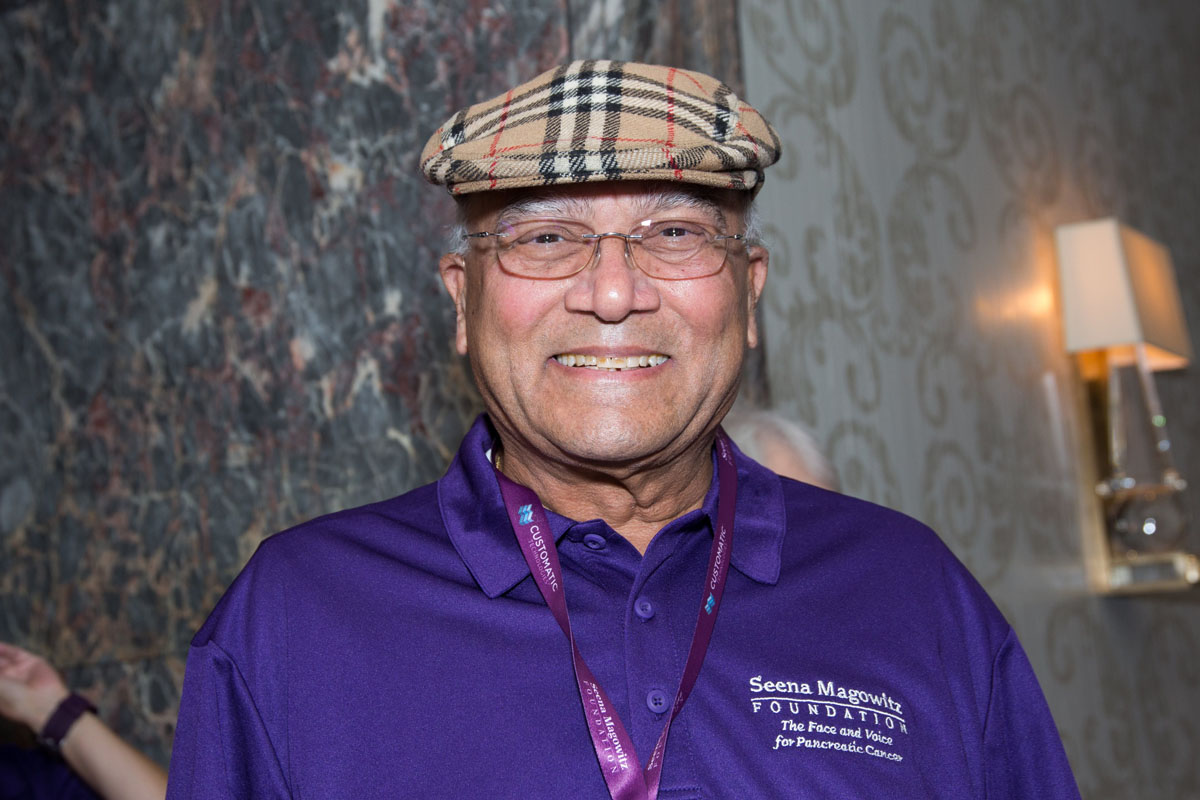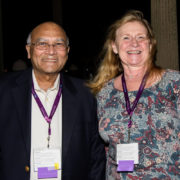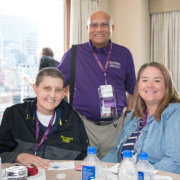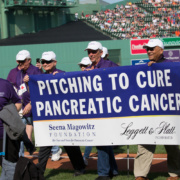
Written By Debra Gelbart
September 10, 2017
Arvind Varma, Ph.D.
Diagnosed: November 2015
Legacy Hero: July 14, 2019
Research Proves To Be a Lifesaver
The only symptoms Arvind Varma, Ph.D. had before his diagnosis were a persistent, but not severe, stomach ache and some weight loss. The weight loss didn’t alarm him because he had been trying to shed a few pounds. That was in October 2015. But the pain concerned him enough to visit his doctor, and in November of that year, he learned he had Stage 4 pancreatic cancer.
As devastating as the diagnosis was, it wasn’t entirely unexpected. “I have a long family history of cancer,” Dr. Varma told assembled guests in August 2017 at the Seena Magowitz Foundation Annual Golf Classic in Boston. “My mother died at age 37 of esophageal cancer when I was 8 years old. My younger sister and eldest brother also died of cancer. Another older brother had breast cancer which was caught early and cured. So I regularly had tests to see if cancer was coming for me.”
He and his wife Karen relocated to Scottsdale for seven months so he could receive the treatment, a combination of three chemotherapy drugs that had not been combined before to treat pancreatic cancer, administered intravenously every three weeks for nine cycles.
Dr. Varma was also the head of the School of Chemical Engineering at Purdue at that time. Throughout his treatment, he was able to continue his work remotely, regularly conferring with colleagues and students through email and Skype.
An Amazing Response
His clinical response to the treatment was nothing short of stunning. Before he enrolled in the study, his tumor marker—one way doctors and researchers assess the extent of a particular cancer—was 5,500. A normal value is 0 to 37. Immediately after he finished the treatment, his tumor marker had dropped to 120. He returned to Indiana in July 2016.
Since then, he has taken an oral chemotherapy, Lynparaza, twice daily. Currently, his tumor marker is 11—comfortably in the normal range. And his scans show no evidence of disease.
While he was undergoing treatment in Scottsdale, Dr. Varma also had genetic testing, which revealed that he has a BRCA 2 mutation, making him more susceptible to pancreatic cancer. He believes this also explained his family history of related cancers.
“TGen, HonorHealth and the Seena Magowitz Foundation, which funds so much of this groundbreaking research, have given me and many other patients hope, quality of life during treatment and endless possibilities for a fulfilling and productive life,” Dr. Varma said.
Of the 24 patients the research team was able to evaluate in the TGen Triple study, two had what’s called a “complete response,” meaning they had no evidence of disease when they had their best response to treatment.
Another 15 patients, like Dr. Varma, had what’s called a “partial response”—a reduction by at least 30 percent in the size of their tumors and a falling tumor marker. Four patients experienced no change in their disease and three experienced an advancement (called “progression”) of the cancer.
Particulars of The Regimen
The three drugs administered in combination are Nab-Paclitaxel (Abrane), Gemcitabine and Cisplatin. Nab-paclitaxel plus Gemcitabine already is FDA-approved for treatment of advanced pancreatic cancer. Research has shown that tumor cells like those in pancreatic cancer possess DNA repair problems, so they may be highly sensitive to the drug cisplatin.
Building on this three-drug foundation, a new study is underway at HonorHealth Research Institute, adding a synthetic Vitamin D and an Immunotherapy drug called Nivolumab (whose brand name is Opdivo) to the Tripal Trial. Additional information on the trial can be found at www.clinicaltrials.gov, identifier NCT02754726. For information about eligibility for participation in this or other clinical trials, call 480-323-1339 or 877-273-3713. For more information about the TGen Triple study, visit www.clinicaltrials.gov and search for “PCRT12-001.”
A busy life with careful follow-up
Dr. Varma comes to Scottsdale every three months to see his medical oncologist, Erkut Borazanci, M.D., who also is a clinical investigator at HonorHealth Research Institute and medical director of the institute’s early cancer detection program and to see Daniel Von Hoff, M.D., the world’s leading pancreatic cancer researcher with TGen. Every month, through his oncologist in Indiana, his tumor marker is evaluated.
In between visits, he has been traveling and working during this, his sabbatical year through the university. He has gone to University of California Santa Barbara and to ETH Zurich in Switzerland—a science, technology, engineering and mathematics university that has produced 21 Nobel laureates—to research and present seminars. Beginning in November and continuing until next March, he will be based at the University of California at Los Angeles.
“I‘m extremely grateful to be able to continue working and researching during my entire treatment,” Dr. Varma said. “And I urge anyone with a family history of cancer to undergo genetic testing. If any mutations are discovered, your health can be closely monitored, and in many cases, disease can be detected earlier than it might have been without knowledge of susceptibility.”














